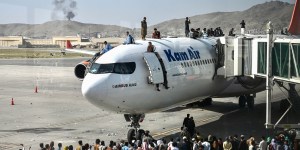Lenten Campaign 2025
This content is free of charge, as are all our articles.
Support us with a donation that is tax-deductible and enable us to continue to reach millions of readers.
ON AUG. 19, 2021, the 102nd anniversary of the country’s independence from British rule, Zabihullah Mujahid, spokesperson for the Taliban, declared Afghanistan as the “Islamic Emirate of Afghanistan” on the Taliban’s official Twitter account.
Thomas Heine-Geldern, executive president of Aid to the Church in Need (ACN), expresses profound concerns about the future of the country:
“During the rule of the previous Emirate of Afghanistan (1996 to 2001), the Taliban imposed a strict version of sharia law nationwide. We can expect that Sunni Islam will be the official religion, that Sharia law will be reimposed, and that hard-won respect for human rights, including a relative measure of religious freedom during the last 20 years will be revoked.
“ACN predicted the deterioration of the situation in its recent Religious Freedom in the World Report. Throughout the 22-year history of this report, Afghanistan has always been among the countries that most severely violates this fundamental right. Especially in the last three years, the report highlights, there have been repeated and egregious attacks against places of worship, religious leaders, and worshippers.
“Regrettably, several countries quickly declared their sympathies for the new Emirate. This will not only help legitimize the Taliban, but also embolden authoritarian regimes all over the world, particularly in the region, spurring increasing violations of religious freedoms in their own countries. International recognition of the Taliban will also act as a magnet for smaller radical Islamic groups, creating a new constellation of religious terrorist factions that could supplant al-Qaeda and the Islamic State. Among others, areas of concern include Pakistan, Palestine, and the province of Idlib in Syria. The situation for Christians and other religious minority communities already suffering oppression, will further deteriorate.

“The content of the talks that have been taking place in Doha since 2020 between the Taliban and the West, and between the Taliban and the Afghan government, remains relatively secret. Thus, we are unable to make a more precise assessment of what the agreements reached will mean for the Afghans who do not espouse the extreme Islamist views of the Taliban.
“Countless thorny diplomatic questions remain. The unexpected and voluntary flight from power by President Ashraf Ghani creates ethical and moral difficulties for the West, as those countries participating in talks with the Taliban expressed weeks ago that they would never recognize a regime that has taken power by force. Will be there a response from the Taliban on any human rights claims without formal channels? The fact that most Western embassies are closing, and international observers are leaving, like they did in Syria in 2011, is not a good omen.
More than 99 percent of the population is Muslim; the biggest group are Sunni, and 10 percent are Shia. Among other believers are a relatively equal number of Hindus, Bahai’s, Buddhists and Christians. Estimates of the number of Christians in Afghanistan vary from a high of 20,000 to possibly as low as 1,000. They live their lives of faith in secret, so accurate numbers are impossible to come by. There has been only one Catholic church in the country, hidden away at the Italian Embassy that had to shut down because of the COVID-19 pandemic. In 2018, there were an estimated 200 Catholics in Afghanistan.
In 2010, in territory that it controlled, the Taliban killed 10 humanitarian workers, who had been accused of spreading Christianity and being foreign spies. Reportedly, some leaders of underground house churches have received letters from Taliban that they are being watched. There is concern that Christians may be killed outright and that young Christian girls will be given in marriage to Taliban fighters. Even before the Taliban takeover, Christian converts from Islam faced ostracization and even violence from family members. As of August 16, two Indian Jesuits and four Missionaries of Charity were awaiting evacuation. Supporting Afghanistan’s Christians in practical ways will be extremely difficult—and prayer will be especially important.
For more information consult the Afghanistan report in the Religious Freedom Report.
This article was first published by Aid to the Church in Need and is republished here with kind permission. To learn more about ACN’s mission to help the suffering Church, visit www.churchinneed.org (from the U.S.) and www.acninternational.org (outside of the U.S.).












